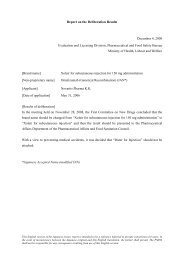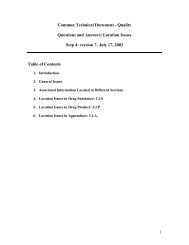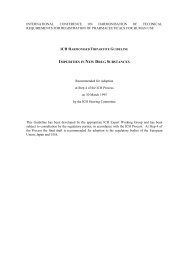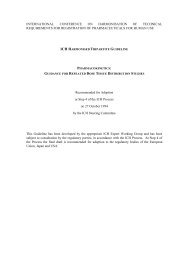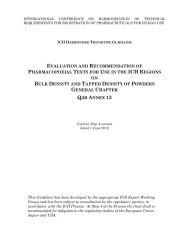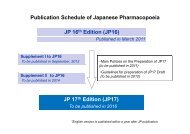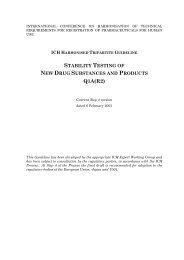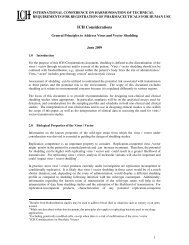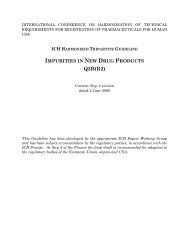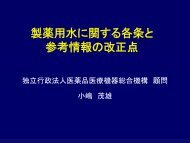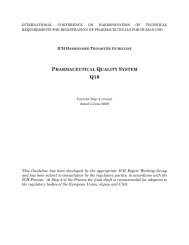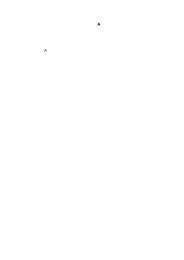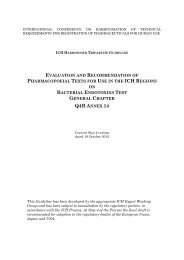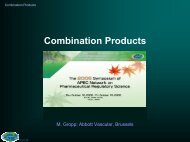4.05 Microbiological Examination of Non-sterile Products
4.05 Microbiological Examination of Non-sterile Products
4.05 Microbiological Examination of Non-sterile Products
- No tags were found...
Create successful ePaper yourself
Turn your PDF publications into a flip-book with our unique Google optimized e-Paper software.
3-3 Growth promotion and inhibitory properties <strong>of</strong> the mediaTest each batch <strong>of</strong> ready-prepared medium and each batch <strong>of</strong> medium prepared either fromdehydrated medium or from ingredients.Verify suitable properties <strong>of</strong> relevant media as described in Table <strong>4.05</strong>-II-1.Test for growth promoting properties, liquid media: inoculate a portion <strong>of</strong> the appropriatemedium with a small number (not more than 100 CFU) <strong>of</strong> the appropriate microorganism.Incubate at the specified temperature for not more than the shortest period <strong>of</strong> time specifiedin the test. Clearly visible growth <strong>of</strong> the micro-organism comparable to that previouslyobtained with a previously tested and approved batch <strong>of</strong> medium occurs.Test for growth promoting properties, solid media: perform surface-spread method,inoculating each plate with a small number (not more than 100 CFU) <strong>of</strong> the appropriatemicro-organism. Incubate at the specified temperature for not more than the shortest period<strong>of</strong> time specified in the test. Growth <strong>of</strong> the micro-organism comparable to that previouslyobtained with a previously tested and approved batch <strong>of</strong> medium occurs.Test for inhibitory properties, liquid or solid media: inoculate the appropriate medium withat least 100 CFU <strong>of</strong> the appropriate micro-organism. Incubate at the specified temperaturefor not less than the longest period <strong>of</strong> time specified in the test. No growth <strong>of</strong> the testmicro-organism occurs.Test for indicative properties: perform surface-spread method, inoculating each plate with asmall number (not more than 100 CFU) <strong>of</strong> the appropriate micro-organism. Incubate at thespecified temperature for a period <strong>of</strong> time within the range specified in the test. Colonies arecomparable in appearance and indication reactions to those previously obtained with apreviously tested and approved batch <strong>of</strong> medium.3-4 Suitability <strong>of</strong> the test methodFor each product to be tested perform sample preparation as described in the relevantparagraph in section 4. Add each test strain at the time <strong>of</strong> mixing, in the prescribed growthmedium. Inoculate the test strains individually. Use a number <strong>of</strong> micro-organisms equivalentto not more than 100 CFU in the inoculated test preparation.Perform the test as described in the relevant paragraph in section 4 using the shortestincubation period prescribed.The specified micro-organisms must be detected with the indication reactions as describedin section 4.Any antimicrobial activity <strong>of</strong> the product necessitates a modification <strong>of</strong> the test procedure(see 4-5-3 <strong>of</strong> Microbial Enumeration Tests).If for a given product the antimicrobial activity with respect to a micro-organism for whichtesting is prescribed cannot be neutralised, then it is to be assumed that the inhibitedmicro-organism will not be present in the product.4 Testing <strong>of</strong> <strong>Products</strong>4-1 Bile-tolerant gram-negative bacteria4-1-1 Sample preparation and pre-incubationPrepare a sample using a 1 in 10 dilution <strong>of</strong> not less than 1 g <strong>of</strong> the product to be examinedas described in Microbial enumeration tests, but using casein soya bean digest broth as thechosen diluent, mix and incubate at 20 – 25°C for a time sufficient to resuscitate the bacteriabut not sufficient to encourage multiplication <strong>of</strong> the organisms (usually 2 hours but not morethan 5 hours).4-1-2 Test for absenceUnless otherwise prescribed use the volume corresponding to 1 g <strong>of</strong> the product, asprepared in 4-1-1 to inoculate enterobacteria enrichment broth-Mossel. Incubate at 30 – 35°Cfor 24 – 48 hours. Subculture on plates <strong>of</strong> violet red bile glucose agar. Incubate at 30 – 35°Cfor 18 – 24 hours.The product complies with the test if there is no growth <strong>of</strong> colonies.10/29



